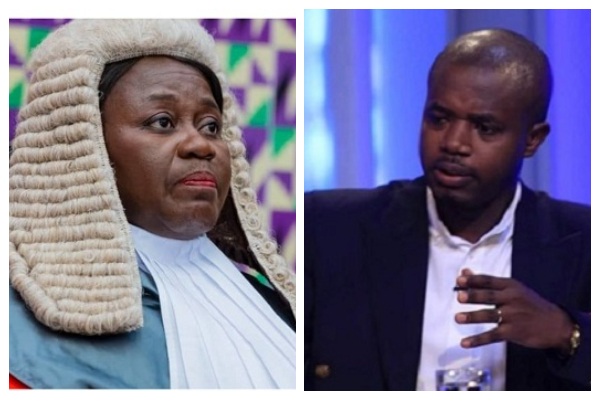[fusion_dropcap boxed="no" boxed_radius="" class="" id="" color="" hue="" saturation="" lightness="" alpha="" text_color=""]‘Y[/fusion_dropcap]es’ campaigners, Quadrant readers will be pleased to learn, are still finding new ways to beclown themselves. Megan Davis, for example, has never taken the October 2023 loss particularly well. In lieu of a single moment of self-criticism, Davis prefers to blame the defeat on—this is a condensed list, so thank me—misinformation, disinformation, Donald Trump’s influence, fear of change, and the Australian populace’s channelling of the racist spirit of the constitutional drafters of the 1890s.
Handily though, Davis cannot discern in the Voice’s trouncing any wider rejection of the Uluru Statement, so it’s full steam ahead on treaty-making and truth-telling.Thomas Mayo, as his latest book attests, has also dodged an outbreak of second thoughts. This is the despite the fact that his prominent Voice advocacy—inclusive of reparations, rental payments, and the abolition of colonial institutions—did so much to lock up the ‘No’ vote the first time around.

Nonetheless, a referendum do-over, when the Australian people are ready and more mature, Mayo suggests, will next time produce his favoured constitutional change. In the meantime, to keep activist energy levels up, Mayo advises decorating your front fence with an acknowledgement of country poster, to indicate the Aboriginal land you’ve colonised.The book under review, Broken Heart: A True History of the Voice Referendum, also adheres to the genre of sore-loserdom.
Shireen Morris, a constitutional lawyer and Macquarie University academic, was an indefatigable ‘Yes’ supporter, as well as a behind-the-scenes architect of the advisory body’s model and scope. In her introduction, she tallies up her 12 years of service in the cause of indigenous recognition, including a PhD thesis on the Voice itself. For many people, all this time and devotion would make Morris an authoritative and sympathetic recounter of the campaign’s painful defeat.
I am not among such people. Though it may not be in the spirit of post-referendum reconciliation, I would add Morris’ broken heart to the win column for constitutional restraint and the electorate’s political wisdom. To be fair, Morris isn’t all that interested in re-building bridges, either, and I kind of like her honesty.
Unlike many Labor politicians’ mealy-mouthed lines in the aftermath of the loss, Morris is often refreshingly forthright. “The Australian people got it wrong in the Voice referendum,” Morris laments, before she wobbles into sappiness: “We chose fear over love.” She also ably represents the elite’s consensus on those pesky ‘No’ voters, who are unlikely to be forgiven anytime soon.
Their wrongthink, she admits, has prompted a dispiriting reappraisal on her part: “The referendum result has changed the way I see Australia and my fellow Australians.”With these scene-setting remarks, Morris launches into her history of the Voice referendum, though at times it may strike readers as an extended tantrum, a recital of grievances. It all began, however briefly, with hope and enthusiasm, as constitutional recognition became the project of Morris’ politics of the radical centre—a kind of unity ticket of left and right in the cause of urgent reform.
Morris calls the radical centre—and try not to snicker—an “empathetic endeavour, requiring us to see the humanity and intelligence in our opponents, and the kernels of truth in their opinions.”The Voice’s design, purpose, and constitutional soundness, Morris alleges, all arose with conservative input and ownership. Therefore, the marketing campaign when the referendum came around should have turned the radical centrist theory into successful practice.
The true reason for the Voice’s failure—as well as the author’s related and unresolved anger issues—is the repudiation of this politics of compromise and cuddliness and its replacement with name-calling and contumely.[fusion_dropcap boxed="no" boxed_radius="" class="" id="" color="" hue="" saturation="" lightness="" alpha="" text_color=""]T[/fusion_dropcap]his explains why Broken Heart features such an expansive rogues’ gallery of ex-friends and former collaborators. Of course, the usual targets—Dutton, Price, Advance, the media, the Nationals etc—prompt a good deal of Morris’ huffiness and finger-wagging.
But the real targets of her polemic are the “con cons”, the constitutional conservatives who helped contrive the Voice in the first place, in a once-chummy partnership with indigenous leaders. Their sin—inexpiable by the look of things—was to question the Voice once Anthony Albanese and the cultural Left took progressive ownership of it. Morris accuses her erstwhile allies—again, I have to condense—of flip-flopping, tribalism, dishonesty, backstabbing, sexism, and even conspiracy.
Throughout the book, Morris makes a great deal of her mentorship under Noel Pearson in the project of indigenous recognition. I suspect, however, that she also imbibed his talent for invective and grudge-cultivation along the way. Readers begin each new chapter wondering whom Morris will freshly insult, or how many paragraphs it’ll take before she resumes bashing Greg Craven and Frank Brennan.
Amusingly, all of her enemies still voted ‘Yes’, just with reservations or scaled-back campaign appearances. This only proves that, for Morris, the slightest objection to any aspect of the Voice amounted to insufficient loyalty to the cause. In contrast, the heroes of the book are the Prime Minister and the indigenous members of the Referendum Working Group, who are lavished with praise for— try not to roll your eyes—their alleged enthusiasm for compromise and concession-making.
If this is the politics of the radical centre, the ideal conservative is simply one who agrees with Shireen Morris (left)—a left-wing, failed Labor candidate—on just about everything. Had she consulted a conservative outside of the half-dozen or so in legal academia, she would have learned that much of the right, via Keith Windschuttle, views indigenous recognition as a threat to sovereignty. Enlistees in the radical centre were always going to be scarce and non-representative.
Also—I don’t mean to rub it in—the right’s argument certainly influenced the direction of commentary on the Voice as the campaign got going, and Morris et al never really had answer. There could be something, as Morris counselled earlier, in picking up the “kernels of truth” in your opponents’ worldview; had that been a serious agenda item, it might have taken less than 12 years to realise the quixotic nature of the whole enterprise.To this failure Morris adds a half-baked understanding of her leftist comrades and their infatuation with identity politics.
On various occasions, she whines about being excluded or demeaned by Aboriginal colleagues and activists; though she is a woman of colour, she isn’t indigenous, so the intersectional higher-ups don’t want her in the negotiating room anyway. You can only sympathise for a brief moment, though, as it’s a good reminder of how the ‘No’ vote did us such a tremendous favour: after all, the whole point of the Voice was to embed forever the ideological fatuity of identity politics in our Constitution.I should try to end, I suppose, on a note of good manners, which was the theme of the campaign, at one stage.
For this reader, the internecine squabbles among the Voice advocates certainly had a cheering effect, albeit that wasn’t Morris’ intention. The resentment and disillusion detailed here—fingers crossed—can carry over into future endeavours, such as Makarrata, the Yoorrook Commission as well as treaty-making and truth-telling. Morris offers the insights in this book for “the reformers of tomorrow,” with the hope “they can succeed with better ideas where we failed.
” That also serves as a useful reminder to the Voice’s opponents about the risks of complacency. Soon enough—and I’m kind of looking forward to it—we may be required to break a few more hearts yet again.Broken Heart: A True History of the Voice Referendumby Shireen MorrisLa Trobe University Press The post The Never-Ending Tantrum first appeared on Quadrant.
.
Politics

The Never-Ending Tantrum
When the Voice died, from its ashes sprang a new literary genre, sore-loserdom. Shireen Morris' book is the latest example














